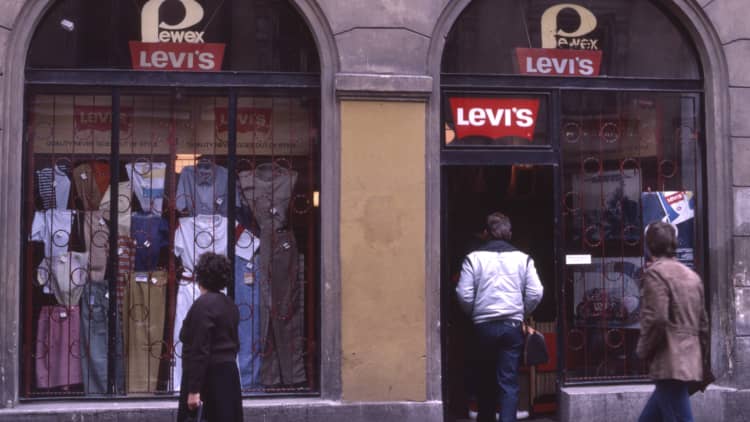
Levi Strauss & Co. is heading back into the public spotlight as a year of change kicks off for denim makers.
The company, which has been private for more than three decades, is expected to begin trading on the New York Stock Exchange on Thursday. The move comes as Levi's next closest U.S. competitors, VF Corp and Gap Inc., plan corporate shake-ups of their own and customers shift their shopping habits.
VF Corp plans to spin off its jeanswear business, which includes Wrangler, Lee, Rock & Republic, into a new public company called Kontoor Brands sometime in the first half of 2019. VF's remaining brands, which include Vans, The North Face, Timberland and others, will remain under the VF Corp parent company.
Gap Inc., meanwhile, is planning to spin off its Old Navy brand into its own publicly traded company, leaving the Gap brand, Banana Republic, Athleta, Intermix and Hill City under the parent company with a name still to be determined.
But those aren't the only changes denim makers are facing. The category has been has been in flux as U.S. consumers shift from jeans to athleisure brands, and do more of their shopping online. Still, the U.S jeanswear market is forecast to improve though the pace of global denim sales are expected slow. As Levi Strauss goes public, it is looking at opportunities to sell more to women, and ring up more sales online and in China.

Levi Strauss sells in 110 countries around the world, in more than 50,000 retail locations. Fifty-five percent of its revenue comes from the Americas, with the U.S. the largest market. Levi generates 28 percent of its revenue in Europe, and 16 percent in Asia.
While overall domestic jean sales are expected to improve in the coming years, Euromonitor predicts the compound annual growth rate will be just 1 percent from 2018 to 2023. That's an improvement from down 2.3 percent between 2013 and 2018. Globally, the market research firm expects global jean sales to rise 2.1 percent from 2018 to 2023, a bit slower than the 3.3 percent pace between 2013 and 2018.
Over the past decade, jean sales globally have grown at a 3.5 percent CAGR, slower than the growth rate of all apparel, according to Bernstein analyst Jamie Merriman. Consumers are buying less "premium" and "super premium" denim than mid- and lower-priced jeans, according to Bernstein research. While Levi sells in a broad price range, most of its merchandise falls below what is considered premium price points.
Premium jean sales have been hurt by the rise of athleisure.
"Instead of buying a new pair of designer jeans, many women have opted for more comfortable and less expensive yoga pants in recent years," Deborah Weinswig, Coresight Research CEO said in a note to clients.
In the last five years, Nike, Adidas, Lululemon, Under Armour and Athleta have gained apparel share in the U.S. as Levi, True Religion, Gap, J. Crew, Banana Republic and Ralph Lauren have lost ground, according to Bernstein.
Around two-thirds of premium denim — and more than 70 percent of super premium denim — are purchased by women according to Bernstein's research. The data suggests those same women have been replacing their jeans with athleisure in recent years, but the trend may be turning.
Women's jeans are expected see a resurgence in 2019, according to NPD's Future of Apparel Report, as "the social, fashion-forward shopper will be the primary investors in women's jeans as they seek comparable alternatives to their activewear."
The growth of athleisure has likely been less of a pressure point for Levi, because its men's category is much larger than its women's. The men's business accounted for $4 billion of Levi's $5.6 billion 2018 revenue, or more than 70 percent. The denim maker says its men's jeans business had the top market share by retail sales in the U.S., France, Mexico and the United Kingdom, which are four of its top five markets.
Levi targets women, China for growth
Women's is a key growth target for Levi Strauss. Revenue in that segment grew by 25 percent from 2016 to 2017, and 29 percent from 2017 to 2018.
One rival is American Eagle, which sold more than $1 billion of denim in the U.S. last year, directly to consumers through its stores and website.
"American Eagle is the number one women's jeans brand in the U.S. and number two overall in the U.S., according to data from NPD," Chad Kessler, American Eagle global brand president said. "Our women's business is in the leading position and is growing rapidly. Our men's jeans business is the largest specialty jeans brand in the U.S."
Kessler expects "significant growth to continue in both men's and women's jeans."
"The scale of our business combined with selling directly to our customers allows us to provide a higher quality, more innovative jean at a more competitive price point than our main competitor," Kessler said without directly naming Levi. "A wholesale business model runs on a margin structure that supports both the wholesale brand and the retailers who carry it. This adds cost and reduces the value equation for the customer. Our direct model allows us to put more quality and innovation into our jeans for a similar or lower ticket price."
For Levi Strauss, wholesale retail is its largest channel, with 57 percent of Levi's revenue coming from department stores, specialty retailers, e-commerce sites and franchisees.
Levi notes in its prospectus that "despite recent challenges to chain retailers and department stores, primarily in the United States, net revenues from our top ten wholesale customers globally increased 8 percent year-over-year in fiscal year 2018."
Still, if consumers shy away from higher-end denim as suggested by Bernstein data, that could be problematic as Levi aims to increase its presence in the segment. The denim maker states its expanding wholesale relationships "with a focus in the United States on growing premium accounts such as Nordstrom and Bloomingdale's," both higher-end department stores.
But Levi wants its reach to be across the price point spectrum. The company said it's also "targeting value-conscious consumers through our Signature by Levi Strauss & Co. and Denizen brands" carried by Walmart and Target, respectively.
Levi also is expanding online, where denim sales have been growing. Over the past year, 17 percent all online buyers have purchased jeans over the web, up from 15 percent in 2017, according to NPD's Checkout information. Levi e-commerce revenue on its 43 branded sites grew 18 percent in 2018, and 22 percent in 2017.
The denim maker is selling more on Amazon too, with its own branded landing page meant to mimic the experience shoppers would find on its own e-commerce sites.
The biggest opportunity for Levi could be with Chinese consumers, as only 3 percent of its revenue came from China in 2018. China accounts for a fifth of the global apparel market, which leaves opportunity to grow. Bernstein cites a 6 percent growth rate for jean sales in Asia over the last decade.
MKM Partners analyst Roxanne Meyer estimates high-single digit sales growth for Levi in Asia, compared to low-single digit to mid-single digit growth in the Americas.
"There is no shortage of sales growth opportunity — by channel, geographies, gender, brand and by category," Meyer wrote in a note to clients. MKM Partners is not participating in the Levi IPO, nor is the firm making a recommendation. Still Meyer offers "we are bullish on the growth opportunity and position of this company."



